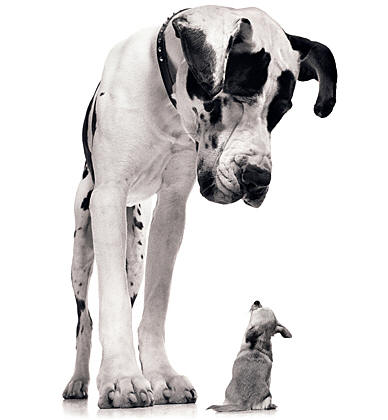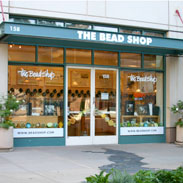Running with the Big Dogs: CSR in Small Business
/ Often when we talk about corporate social responsibility, we assume people are talking about "the big dogs" – companies like Proctor and Gamble, Nestle, Coca-Cola, and of course Walmart.
Often when we talk about corporate social responsibility, we assume people are talking about "the big dogs" – companies like Proctor and Gamble, Nestle, Coca-Cola, and of course Walmart.
And certainly these powerhouses dictate a lot of what gets discussed, watched, and measured, if only because of their sheer scale and impact on the global business community.
But what about companies that don’t fit into the same tiers as these big players? What does sustainability or CSR look like for small and medium-sized businesses?
Recently I attended a talk at Mills College featuring the EVP of Marketing at Clif Bar and Company, Michelle Ferguson.
Before the talk I didn’t necessarily think of Clif Bar as a small company, but in fact it only employs 250 people. What the company might lack in size, however, it makes up for in passion for its consumers and its products. Whether through in-person events, an accessible social media presence, or high-touch consumer service, it’s clear that Clif Bar really does value the people who buy its products (and doesn’t just think of us Luna and Clif Bar eaters as a transaction to be managed).
And, in large part thanks to its founder Gary Erickson, Clif Bar and Company also boasts a very well-rounded, active and engaged sustainability program (for example, choosing to use only all organic and natural ingredients because it’s healthier for us and healthier for the environment).
Overall Clif Bar’s sustainability agenda rolls up into one philosophy called the 5 Aspirations, which include:
- Sustaining Our People
- Sustaining Our Brands
- Sustaining Our Communities
- Sustaining Our Planet
- Sustaining Our Business
While each Aspiration is important, Michelle said she considers Sustaining Our Business to be the foundation for everything else because, at the end of the day, Clif Bar and Company is a business. In order to support the other four Aspirations, Clif Bar’s business needs to be profitable; and, as the business grows, so do the other Aspirations.
This may not be a surprising statement, especially given the fact that most big companies will say the same thing. Still, when you’re talking about a small or mid-sized business – when there’s generally just less money and fewer resources to go around – ensuring a solid financial foundation really must come first.
 Nowhere is this idea more evident than in my mom’s business, The Bead Shop. My mom Janice has been a small business owner for over 30 years, and recently her company has gone through some growing pains as the economy weakened and her customers changed their buying habits. In fact, in 2008 she closed her brick and mortar store and chose to focus exclusively on online sales through www.beadshop.com.
Nowhere is this idea more evident than in my mom’s business, The Bead Shop. My mom Janice has been a small business owner for over 30 years, and recently her company has gone through some growing pains as the economy weakened and her customers changed their buying habits. In fact, in 2008 she closed her brick and mortar store and chose to focus exclusively on online sales through www.beadshop.com.
With only three employees (including my mom), you might initially guess that The Bead Shop isn’t doing much in the way of CSR. However, nothing could be further from the truth.
Much like Gary at Clif Bar, my mom is a business owner who believes in giving back – and so she’s made charitable giving and environmental sustainability two very big business priorities, even with the economy the way it is.
In fact, this year she committed to giving 5% of all sales (not profits, but sales) to two very important charities doing great work in the arts and for women (the way she sees it, if Target can give 5%, why can’t she?!). She’s also starting to explore more sustainable options for packaging and mailing out customer orders, including using biodegradable popcorn packaging and stringing bead orders on string instead of tossing them into plastic bags.
That said, as her business grows and changes over time, sometimes it's a challenge for my mom to find the balance between making money and giving it away! She wants to be committed to supporting various nonprofits and investing in more sustainable packaging, for instance, but knows that those kinds of actions can't come at the expense of her business. Ultimately, The Bead Shop's financial health, its financial sustainability, must come first.
In general Clif Bar and The Bead Shop are two very different companies, with very different products and customer bases. Still, as two businesses committed to bettering their communities and the world, perhaps in some ways they’re actually quite similar.
Using their stories as a guide, I've developed the following conclusions about small and medium-sized companies and CSR programs:
- Environmental (or social) sustainability can’t happen if financial sustainability isn’t there. As I said before, you may think this is a no brainer, but sometimes I think the CSR advocates out there (even including me at times) forget that CSR is a business strategy that requires money and other resources to thrive. And nowhere is this more true than in a small to medium-sized company where each sale can determine how much you can return to and invest in the community.
- CEO/Founder buy-in for sustainability – plus staying private – makes a huge difference. Unlike publicly-traded companies that have shareholders to consider, private companies like Clif Bar and The Bead Shop are led by committed sustainability champions who have the freedom and authority to make ethical, values-driven behavior a priority in their businesses, no matter how tough the economy or how small the budget.
- Often small and medium-sized businesses have no model to follow. Unlike big brands who have competitors to mimic and consultants to pay, smaller businesses have to figure out their CSR programs on their own (or in my mom’s case, with my help!). Deciding what causes align with your business model and how much to commit to which organization, not to mention learning how to evaluate your carbon footprint, can be a daunting task for a small business owner with a million things on her plate.
- Transparency and communication with consumers is king. Sure, transparency is the buzzword of the year. But when your business is small and each sale makes a huge difference, explaining your goals and mission clearly and authentically can be a tremendous differentiator for your company and help you build long-lasting relationships with your customers. In my opinion, the smaller you are, the more your consumer relationships (and by extension, your CSR communications) matter.
The more I think about it, the more I’m convinced of the important role small and medium-sized businesses can play in shaping the CSR conversation on both a local and national level. While they might not be as flashy or loud as the campaigns being run by larger brands, these smaller businesses are making a difference and impacting local economies and communities.
I encourage you to think through what small and medium-sized businesses in your neighborhood are running their own CSR campaigns – what do you think of them? What unique challenges or opportunities are they facing compared to bigger companies? And how can you help support them?
(PS: A quick and shameless plug - if you're looking for fun, creative holiday gifts and inspiring jewelry ideas, not to mention a way to support a small business's CSR program, check out my mom's store!)

